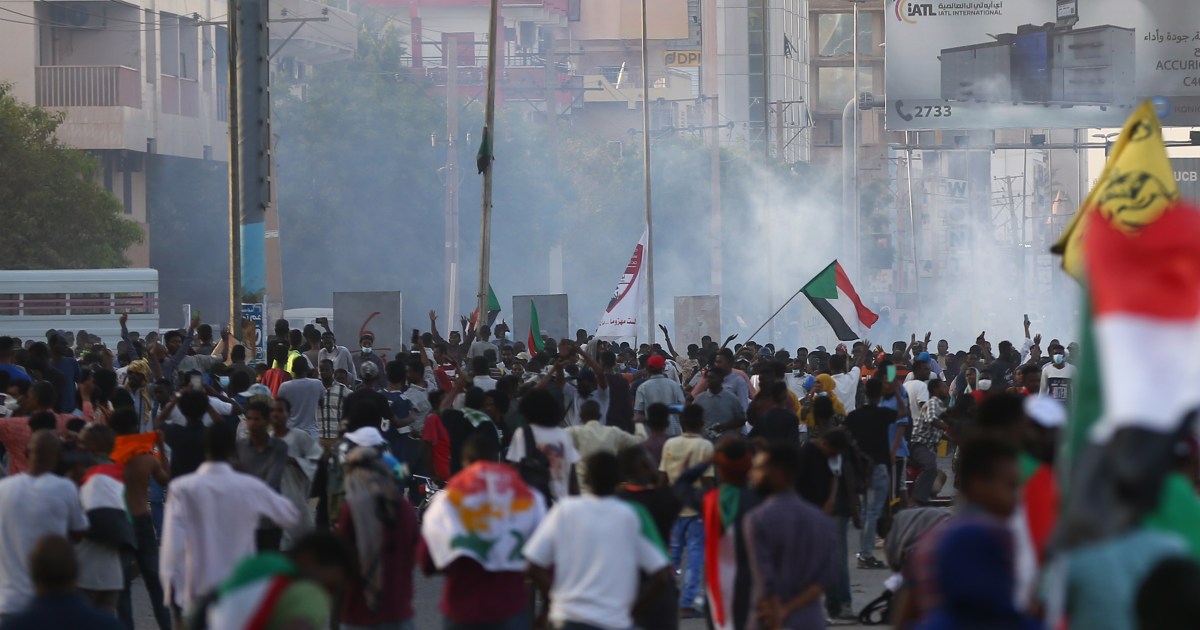One person was killed and dozens wounded in the demonstrations that took place yesterday, Wednesday, in different parts of Sudan, in protest against the measures taken by Abdel Fattah Al-Burhan, head of the Sovereignty Council and the commander of the army, and to commemorate the sit-in of the General Command that led to the overthrow of former President Omar Al-Bashir 3 years ago.
The Central Committee of Sudan Doctors said - in a statement - that a young man named Tayeb Abdel Wahab, 19, was killed "after being shot by the forces of the authority" during their suppression of a demonstration in the city of East Nile in Khartoum state, bringing to 94 the death toll from the demonstrations since what he describes Protesters staged a "coup" led by Al-Burhan on October 25, according to the committee.
The committee indicated that the total of those injured during yesterday's demonstrations amounted to 78 injuries in the capital, Khartoum, and the city of Wad Madani, in the state of Al-Jazeera (in the center of the country).
And it reported that it had counted 78 injuries, including 6 injuries from live bullets, 22 cases of scattered gunfire, likely from a cartridge weapon, and 8 injuries to the head from tear gas canisters belonging to the security forces, explaining that the injuries included the three cities of Khartoum (Khartoum, Bahri, Omdurman) and Wad Madani. (center of the country).
Eyewitnesses stated that thousands participated in demonstrations that took place across the country yesterday, Wednesday, and the security forces fired tear gas in the center of the capital, Khartoum, while the Sudanese Doctors Committee confirmed that "the forces of the military coup d'état stormed Al-Jawda Hospital (in the capital) and fired tear gas inside, terrifying patients and cadres. medical treatment and cause a number of them to suffocate."
He also recorded the release of tear gas in Omdurman and Wad Madani (south).
Eyewitnesses reported that the Sudanese security forces deployed since the early hours of yesterday morning around the presidential palace and the army headquarters, and closed the bridges linking Khartoum with its other major cities.
The calls to protest against what the demonstrators considered a “coup” came on the third anniversary of the start of the sit-in in the center of the capital in 2019, to demand an end to Al-Bashir’s rule, and Al-Bashir was overthrown on April 11, 2019 after his rule lasted 3 decades.
These protests also coincide with the anniversary of the popular uprising on April 6, 1985 that overthrew President Jaafar Nimeiri.
The overthrow of Al-Bashir did not succeed in persuading the protesters to end their sit-in in front of the army headquarters, but rather they insisted on remaining until power is handed over to civilians.
And in June 2019, people in military uniforms dispersed the sit-in, killing at least 128 people, according to an independent committee of Sudanese doctors.
After dispersing the protesters, the civilians and the military agreed on a transitional period to run together until the country reaches full civilian rule.
Since October 25, 2021, the country has witnessed a political crisis and protests rejecting exceptional measures taken by Al-Burhan, most notably the imposition of a state of emergency and the dissolution of the Sovereignty Councils and the Transitional Ministers, which political forces consider a military coup, which the army denies.
Since that date, about 90 protesters have been killed by the security forces, according to the movement that organizes the protests.

